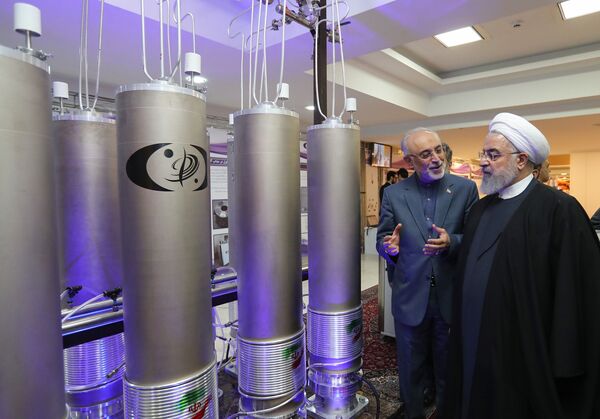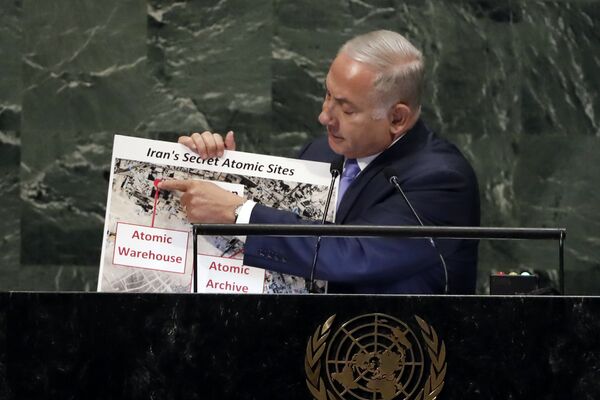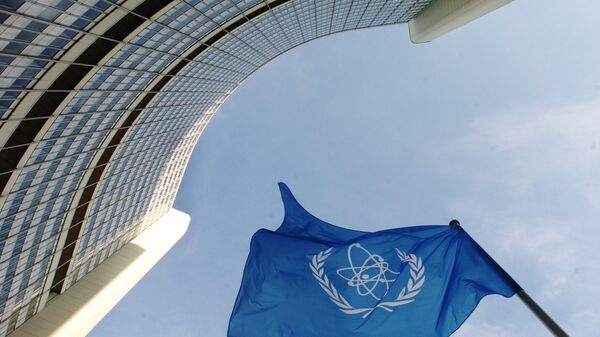IAEA inspectors have carried out an inspection of a warehouse mentioned by Israeli Prime Minister Benjamin Netanyahu in his speech to the UN General Assembly last September, finding traces of uranium which Iran has yet to account for, two diplomats who follow the agency’s work have told Reuters.
Iranian officials and IAEA representatives have yet to comment on the story.
According to the anonymous diplomats, the IAEA has formally asked Iran to explain the uranium traces, but Iranian officials have yet to do so. One of the diplomats clarified that the uranium traces were not of a weapons-grade quality, and not purified to ‘anywhere close’ to the levels required for a nuclear bomb.
“There are lots of possible explanations,” one of the diplomats said.
It remains unclear whether the alleged uranium traces predate the 2015 nuclear treaty, or are more recent.

Earlier this summer, Israeli media reported, citing ‘top Israeli sources’, that the IAEA had discovered the traces of radioactive materials at the Iran facility in June, but had held back on making its findings public. Media noted at the time that “the storing of radioactive material in a secret facility without informing the IAEA is a breach of the Treaty on the Non-Proliferation of Nuclear Weapons, to which Iran is a signatory.”
Tel Aviv, which is not a signatory to that treaty, has previously received flak from Iranian officials for its alleged double standards, with Foreign Minister Mohammad Javad Zarif pointing out late last year that Israel was the only country in the Middle East with an actual “secret and undeclared nuclear weapons program – including an actual atomic arsenal.”
Officially, Israel neither denies or confirms possessing nuclear weapons.
The IAEA has previously indicated that it had “no credible” evidence whatsoever that Iran has worked on a nuclear weapon after 2009, and said it had considered the issue “closed” since 2015, when Iran, the US, Russia, China and several European countries signed the Joint Comprehensive Plan of Action (JCPOA) nuclear deal.
In a speech to the UN General Assembly in September 2018, Netanyahu said Mossad had discovered a second secret atomic warehouse in addition to the one mentioned in his ‘Iran lied’ speech in April of that year. Iran dismissed Netanyahu’s assertions as “ridiculous” and said they were “not even worth talking about.”
In the 'Iran lied' speech, which successfully lobbied the Trump administration to scrap its commitment to the JCPOA, Netanyahu cited some 55,000 pages of documents allegedly seized by Israeli commandos during a daring 2017 raid on an Iranian nuclear facility in Turquzabad, about 25 km outside Tehran, which allegedly proved Iran's violation of its nuclear-related commitments. Tehran called those claims "laughably absurd," accusing Tel Aviv of "trying to see what outlandish claims they can get a Western audience to believe."

Uranium is the basic fuel for nuclear power reactors, and its use as a nuclear weapon requires it to be enriched to a u-235 concentration of 85-90 percent or above. Iran began producing uranium at 5 percent enrichment levels in July, formally breaching the JCPOA, which allows the country to have a stockpile of no more than 660 pounds of uranium with a concentration of U-235 of no more than 3.67 percent. Tehran has promised to continue to reduce its commitments under the JCPOA until its other signatories fulfil their promises and help the country avoid the tough US sanctions put in place after the Trump administration withdrew from the deal in May 2018. At the same time, Iranian officials have repeatedly said that the country would never pursue nuclear weapons, saying such arms "have no place in Islam."


